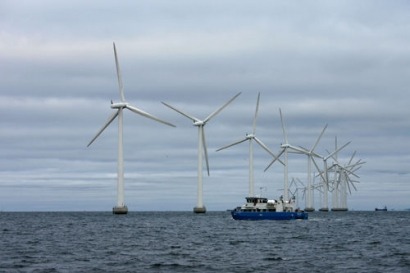
The European Commission needs to encourage EU Member States to carry out maritime spatial planning, and co-operate on how they use their sea space, due to the growing number of users of Europe's seas – including offshore renewable energy – a new report, co-financed by the European Commission's Intelligent Energy Europe programme, finds.
The report entitled “Seanergy 2020” and launched this month at EU Sustainable Energy Week in Brussels, finds that currently there is little in the way of MSP in Europe's maritime states but Member States sharing the same sea basin would benefit from co-operation - and the European Commission could provide MSP through a Directive or guidelines.
"It is necessary to act now" said Dorina Iuga, Senior Project Manager at EWEA. "MSP will guarantee sea space for offshore renewables and would give the industry more confidence to invest. The EU should draft an MSP Directive or guidelines requiring Member States to implement national sea space planning in cooperation with the other Member States sharing a sea basin."
The Dogger Bank area in the North Sea, stretching over four countries and with a multitude of sea uses – from environmental protection areas to wind farms and fishing – is a good example of where coordination on MSP is key: helping to minimise conflict between different sea users.
The Seanergy 2020 project will formulate concrete policy recommendations on how to best deal with MSP and remove MSP obstacles that stand against the deployment of offshore renewable power generation. The project focuses particularly on offshore renewable energy and related grid infrastructure. Moreover, it will provide policy recommendations for a more coordinated approach of the MSP and for a larger deployment of offshore renewable (wind, wave, tidal).
These recommendations will be promoted and addressed to different national, regional and European authorities; they will also be disseminated to the different maritime users through specific bilateral meetings and workshops organised in four different sea basins (Atlantic, Mediterranean, Baltic and North).
The project could serve as background for the preparation of further legislative measures and MSP practices at the regional, national and European levels.
In particular, Seanergy 2020 specific objectives are to:
The Seanergy 2020 consortium is composed as follows: EWEA (coordinator), Belgium; University of Birmingham, United Kingdom; 3E, Belgium; Stifftung Offshore Windenergie, Germany; Laboratório Nacional de Energia e Geologia, Portugal; Energieonderzoek Centrum Nederland, Netherlands; Klaipeda University Coastal Research and Planning Institute, Lithuania; and Center for Renewable Energy Resources, Greece.
For additional information:

